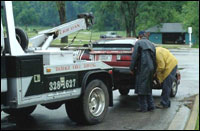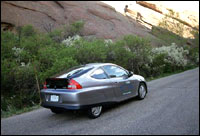It’s not easy to knock AAA. The venerable organization has 45 million members who count on it for trip insurance, travel advice, and, most of all, emergency services. It’s no wonder that many members have sworn lifetime loyalty to Triple A: Rescuing drivers marooned on dark, lonely highways can do wonders for membership renewal rates.

Triple eh?
But is there a seedier side to this respected organization? Environmental and smart-growth activists say AAA’s small team of lobbyists uses the group’s outsized membership and down-home image to promote an agenda that is ecologically irresponsible.
In recent years, AAA spokespeople have criticized open-space measures and opposed U.S. EPA restrictions on smog, soot, and tailpipe emissions. According to a 2001 article in OnEarth magazine by Michael A. Rivlin, the AAA even bashed the 1990 Clean Air Act, saying the law served to “threaten the personal mobility of millions of Americans.”
The group is also a member of the auto industry-dominated American Highway Users Alliance, a powerful pro-pavement lobby. Although AAA spokesperson Mantill Williams says his group doesn’t support all AHUA positions, critics argue that the AAA’s credibility often helps the highway alliance get what it wants.

Are AAA members in the dark?
Last year, the alliance, with the initial help of the Southern California AAA affiliate, crusaded (unsuccessfully, as it turned out) against the state’s crackdown on carbon dioxide emissions from passenger cars and light trucks. The AAA affiliate in Washington state enthusiastically backed Referendum 51, a highway-dominated transportation-funding measure defeated by voters in the November election.
“Everyone loves the AAA, because it gets them out of jams,” says Barbara McCann, director of information and research for Smart Growth America. “What isn’t as well known is that AAA represents a very narrow viewpoint.”
So far, the criticism hasn’t made much of a dent; without AAA assistance, after all, stranded drivers would really be stranded. But now, the nation’s favorite auto club is facing something even more dangerous than bad press: competition.
Getting Better All the Time
Enter Mitch Rofsky and Todd Silberman. Rofsky and Silberman, who grew up together in Columbus, Ohio, and were once part of the same Cub Scout troop, are both seasoned entrepreneurs — and committed environmentalists.

Help is on the way.
In 1979, Silberman co-founded Lifeco, a $1.5 billion travel agency that he sold to American Express in the early 1990s. Rofsky, a former attorney for Ralph Nader’s Public Citizen group, left the nonprofit world to become one of the nation’s most successful green entrepreneurs: He was president of the Working Assets Mutual Funds, which later created the well-known long-distance telephone company and credit card service. Rofsky also founded the Massachusetts-based American Consumer Insurance Agency, a socially responsible insurance company.
In the mid-1990s, some environmental activists told Rofsky about their frequent run-ins with AAA lobbyists, and mentioned that an alternative travel club might find a following among environmentalists. Rofsky called up his childhood buddy Silberman, who was living in Portland, Ore., running a company called Elephant’s Trunk Travel. Rofsky not only got some encouraging advice about opportunities in the travel industry; he also found an enthusiastic business partner. The pair merged their insurance and travel businesses to form a Portland-based company called TripleE, later renamed Better World Travelers Club. They soon acquired an Internet database of more than 50,000 vacation homes and bought and merged several Oregon travel agencies.
Last May, Rofsky and Silberman started selling memberships in the Better World Travelers Club to family and friends. The following month, the club officially opened for business, and it now has about 20 employees and 5,000 members.

Better World Travel.
Like AAA, Better World offers emergency assistance, trip insurance, and travel advice. Road America, a network of about 50,000 local towing companies, provides emergency services for the new club; the network successfully responded to its first call from a Better World member last summer. Members can also call Better World to get AAA-style road-trip advice (staffers encourage members to use electronic maps rather than the paper versions), and the company’s travel consultants can make domestic and international plane, hotel, and rental car reservations.
Unlike AAA, though, Better World offers its clients travel service with a conscience. The feel-good perks of membership might sound familiar to anyone who’s signed up for Working Assets Long Distance — though Better World members don’t get any ice cream. Better World gives 1 percent of its annual revenues to environmental causes and currently donates $11 to its “carbon offset fund” each time a club member makes a plane reservation. Money from this fund is now helping to replace outdated boilers in the Portland public schools, and Rofsky says it will eventually go toward environmental cleanup efforts in members’ destinations: “If people are flying to Colorado to go skiing, we’ll find a group in Colorado to donate to.” Through discounts and promotions, Better World also encourages its members to rent hybrid vehicles, stay in environmentally responsible hotels, and sign up for eco-tours.

Insight into hybrid car rentals.
Jonathan Budner, a green-building consultant in Portland, joined Better World less than a month after it opened for business. Though he was “perfectly happy” with AAA’s services, he says, he had read about AAA’s questionable environmental record and was eager to switch. Budner’s wife, Heather Helming, an AAA member “since she got her driver’s license,” was a tougher sell; only when she learned that Better World used an established network of emergency-service providers did she agree to sign up. So far, Budner and Helming have used Better World to make travel plans and plane reservations, and both are pleased with the club’s services. They say they’d probably opt for hybrid vehicle rentals and green hotels even without the Better World discounts, but “it’s nice to have a travel club that endorses those values,” says Budner.
Yet at its core, critics say, Better World is still about internal combustion. “We get asked if people should really be traveling,” says Rofsky. “But I think it’s progressive to travel. The worst thing in the world would be for people to never leave home. We’re trying to help them travel as lightly on the Earth as they possibly can.”
Cool Travelers
Rofsky hopes Better World’s travel services will work the same magic for his company as they have for AAA. “In a lot of ways, we want to be just like them,” he acknowledges. Yet at the same time, Better World Travelers Club is pointedly criticizing its 100-year-old competitor. “We’re the cooler, greener alternative to AAA,” says the company brochure. “Do you want to affiliate yourself with those who are Antiquated and Actively Anti-Environment? Or do you want to Travel Cool!?”
“Yeah, they’re okay,” sighs AAA spokesperson Williams when I ask him about Better World Travelers Club. But, he says, the new company is “trying to create a false dichotomy — the idea that you have to choose between roads and [mass] transit. … But it’s not all transit all the time, and it’s not all roads all the time. We’re for a balanced policy.” AAA’s lobbyists, he says, only try to make sure that all polluters, not just motorists, do their part to clean up the air.
Rofsky and Silberman are betting that the AAA’s “balanced policy” is starting to rub some of its members the wrong way — that a substantial number of people want a travel club that isn’t in cahoots with anti-environmental lobbies. “I believe that the marketplace works, that it gives consumers what they want,” says Rofsky. “We need to be persuading consumers that business can do a lot more for them.”
AAA isn’t going to be put out of business anytime soon, but Rofsky has big dreams. “I say, it took AAA 80 years to get to 20 million members,” he says. “Let’s see where we are in 80 years.”


